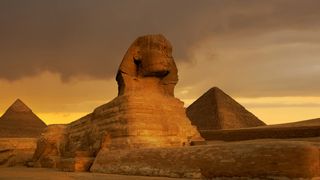How old is ancient Egypt?
Does ancient Egypt's origin have an agreed-on date?

To many, Egypt's history seems to stretch back into time immemorial. But how old exactly is ancient Egypt?
It depends how you define ancient Egypt, said Aidan Dodson, an Egyptology professor at the University of Bristol in the U.K. "If you take it as meaning the civilization that incorporated pharaonic kingship, the language that was written in hieroglyphs, and the religion that was finally replaced by Christianity, it began around 3100 BC, and ended around AD 400," Dodson told Live Science in an email.
Kathryn Bard, a professor emerita of archaeology and classical studies at Boston University, offered a similar date. "The pharaonic state began ca. 3,000 [B.C.]," Bard told Live Science in an email.
Humans were living in Egypt long before 3000 B.C., however. The "oldest known human presence in the Nile Valley [is] estimated to be some 400,000 years ago," Pierre Vermeersch, a professor emeritus of geography at Catholic University of Leuven (KU Leuven) in Belgium, wrote in the book "Palaeolithic Living Sites in Upper and Middle Egypt (opens in new tab)" (Leuven University Press, 2000).
Related: Who was the ancient Egyptian god of death?
Agriculture in Egypt dates back to about 5000 B.C., Sally Katary, who was an Egyptology professor at Laurentian University in Ontario, wrote in an article in "The Encyclopedia of Ancient History" (Blackwell, 2013). By 4100 B.C., permanent year-round agricultural villages had been established in parts of Egypt, Katary wrote.
Some year-round settlements eventually grew into cities. Naqada and Hierakonpolis (also known as Nekhen) became important urban centers between 3500 B.C. and 3000 B.C., Steven Snape, an honorary professor of Egyptian archaeology at the University of Liverpool in the U.K., wrote in his book "The Complete Cities of Ancient Egypt (opens in new tab)" (Thames & Hudson, 2014).
Around 3100 B.C., Egypt unified under a pharaoh, and a writing system, often called hieroglyphs, was established. The Egyptian priest Manetho — who lived millennia later, around the third century B.C. — reported that the first ruler of this united Egypt was a king named Menes, but modern-day scholars debate the exact identity of Menes and the accuracy of Manetho's claim.
Live Science newsletter
Stay up to date on the latest science news by signing up for our Essentials newsletter.

Owen Jarus is a regular contributor to Live Science who writes about archaeology and humans' past. He has also written for The Independent (UK), The Canadian Press (CP) and The Associated Press (AP), among others. Owen has a bachelor of arts degree from the University of Toronto and a journalism degree from Ryerson University.
Most Popular

By Harry Baker

By Ben Turner

By Jamie Carter